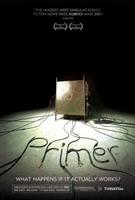Primer
 Director: Shane Carruth
Director: Shane CarruthMain Cast: Shane Carruth, David Sullivan, Casey Gooden, Anand Upadhyaya
Writer(s): Shane Carruth
Director of Photography: Shane Carruth & Anand Upadhyaya
Producer: Shane Carruth
Editor(s): Shane Carruth
Original Score By: Shane Carruth
Release Date: 2004 January 16
(This data is correct. It was unmistakably a one man show. ~RG)
I like to consider myself a reasonably intelligent person, but this movie forced me into serious thoughts of self insufficiency. It was one of those films that I watched intently and when the credit reel began I said to myself, "Uh, I don't get it". It begs for repeat viewing, not because it was so fantastic, but because it was so bewildering. With that said, temper my opinions with the knowledge that after watching only once I may have missed something or possibly a lot of things.
For a first time director/writer/composer/producer/editor on a measly $7000 budget, this was quite a feat for Carruth. I was impressed with the acting and the complex dialogue. The characters were believable and not overstated. The scene where they are working in the garage building things in dress slacks and ties was a testament to the true men they were: engineers. The dialogue delivery, particularly in the first part of the movie, was muddled by multiple characters talking at once about complex topics. The result was a feeling of playing catch up the rest of the movie as things unfolded. This storytelling method was a bit too abrupt for me.
The editing was rough, but may have been intentionally so to communicate a degree of confusion and frustration that was being experienced by the characters. If that was the intent, it was successful. I was amply baffled by a majority of the second act. It is here that repeated viewing would have assisted in the comprehension of the charcters' dilemmas. Carruth moved effectively to using quick edits and closer shots to portray the intensity at the film's end.
The camera work was simple and effective. Many of the shots at the beginning were static with medium focus allowing the viewer to let his eyes meander through the scene at will. In some cases, this method felt very lethargic. But, as the story progressed and the tension built, closer focus and the occasional handheld shot assisted in creating a feeling of unknown expectation and tension.
I was intrigued by the details of the device. The discussion of its construction and the masked effects of its function baited me to want to know more about it. The engineering specifications within the film went way over my head in most cases, but I enjoyed the author's commitment to authenticity. I did, however, wonder why he made such a big deal about the argon gas.
The device, when functional, was primarily used to assist Abe and Aaron in making money in the stock market as they traveled back and forth through time. Aaron talked one time about hitting his boss in the face and the way it would feel. The implication following was that he pursued that fantasy using the device. It seemed that very little good things were accomplished through the devices power other than the "shotgun" incident. The ethical dilemmas faced by the characters were ubiquitous throughout the film's plot development and left me wondering how I would react if faced with similar possibilities.
Here are few questions I have (and there are many more) that will remain unanswered unless I can get some assistance or experience some sort of epiphany:
- What was going on with Abe and his roommates? It was weird. Was he just a really nice guy?
- Why didn't they like their friends and want to include them in the discovery? Were they just being selfish?
- Did the rich guy find the box and use it?
- How many "Aarons" were there at the end of the film? Did he kill himself or his double?
- The prerecorded conversations did not always match the actual events. Aaron was able to redirect the words being used back to the original recorded version. Was he changing the past?
Bottom Line: This film is less about sci-fi special effects and more about intellectual reasoning. I enjoyed it. It made my head spin, but I can't say I didn't take pleasure in the ride. Given the constraints, the writing was solid and thought-provoking, the camera work simple and effective, the lighting natural, and the plot profound, in a heady sort of way. Despite its good qualities and overall successes I refuse to give a film a high rating just because I couldn't understand it and that makes it, by default, artistic.
An admittedly confused, 6 out of 10
~RG




0 Comments:
Post a Comment
<< Home